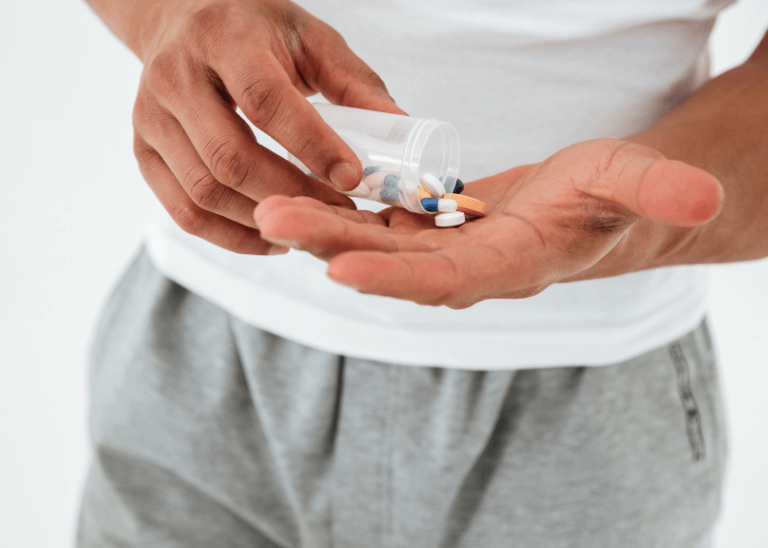Which Drugs Can Cause Gynecomastia in Men?

Gynecomastia is a medical condition characterized by the enlargement of breast tissue in males. It occurs when there is an imbalance in the hormones – oestrogen and testosterone. Although it can affect individuals of any age, it is most commonly seen during puberty and in older men. Apart from hormonal imbalance, Gynecomastia can also be caused by certain medications (such as anabolic steroids, anti-androgens, or medications containing oestrogen), obesity, underlying medical conditions (such as liver or kidney disease), or genetic predisposition.
Gynecomastia is typically diagnosed through physical examination and medical history assessment. In some cases, additional tests like blood tests, hormone level evaluations, or imaging studies may be conducted to determine the underlying cause. Treatment options for gynecomastia depend on the cause and severity of the condition. In many cases, gynecomastia may resolve on its own without treatment, especially during puberty.
Using various drugs in association with treating certain medical conditions can cause gynecomastia in men. Now, let’s check some of the drugs that cause gynecomastia in men.
Anti-Androgens
Medications that block the effects of male hormones like testosterone can lead to gynecomastia. Examples include spironolactone (Aldactone) and finasteride (Propecia, Proscar).
Anabolic Steroids
The use of anabolic steroids, either for performance enhancement or bodybuilding purposes, can disrupt the balance of hormones in the body and result in gynecomastia.
Anti-anxiety medications
Certain benzodiazepines, such as diazepam (Valium) and alprazolam (Xanax), have been linked to gynecomastia, although the occurrence is relatively rare.
Anti-Ulcer Drugs
Some medications used to treat stomach ulcers, like cimetidine (Tagamet), ranitidine (Zantac), and omeprazole (Prilosec), have been associated with gynecomastia. However, the risk is low.
Anti-Depressants
Selective serotonin reuptake inhibitors (SSRIs), including fluoxetine (Prozac) and sertraline (Zoloft), have been reported to cause gynecomastia in some individuals.
Calcium Channel Blockers
Certain medications used to treat high blood pressure, such as amlodipine (Norvasc) and verapamil (Calan), have been implicated in the development of gynecomastia.
While there is no guaranteed way to completely avoid gynecomastia, there are certain steps you can take to potentially reduce the risk or minimize its effects. Here are some suggestions:
Maintain a healthy weight: Obesity can contribute to hormonal imbalances and increase the risk of gynecomastia. Focus on maintaining a healthy weight through a balanced diet and regular exercise.
Limit Alcohol Consumption
Excessive alcohol intake can disrupt hormone levels and contribute to gynecomastia. Try to moderate your alcohol consumption or avoid it altogether.
Avoid illegal drugs
Certain drugs, such as anabolic steroids, marijuana, and heroin, have been linked to gynecomastia. Steer clear of illegal substances to reduce the risk.
Review your Medications
Some medications, including certain antidepressants, anti-anxiety drugs, and medications used to treat prostate conditions, can cause gynecomastia as a side effect. If you suspect that a medication you are taking is contributing to the condition, consult your healthcare provider to explore alternative options.
Be Cautious with Supplements
Some bodybuilding or muscle-building supplements may contain substances that can disrupt hormone levels and potentially contribute to gynecomastia. Exercise caution when using such products, and consult with a healthcare professional if you have concerns.
Manage Underlying Medical Conditions
Certain medical conditions, such as hypogonadism, liver or kidney disease, and certain tumors, can contribute to gynecomastia. Proper management of these conditions under medical supervision may help reduce the risk or severity of gynecomastia.
Communicate with your Healthcare Provider
If you notice any breast tissue enlargement or other concerning changes in your body, consult with a healthcare professional. They can provide a proper diagnosis, identify potential underlying causes, and recommend appropriate treatment options.
It’s important to remember that gynecomastia can have various causes, and some cases may require medical intervention or surgery. Therefore, consulting a healthcare professional is crucial for an accurate diagnosis and personalized advice based on your specific situation.







